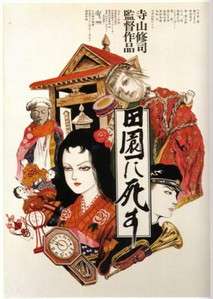Pastoral: To Die in the Country
Pastoral: To Die in the Country (田園に死す, Den-en ni shisu), also known as Pastoral Hide and Seek, is a 1974 Japanese drama film directed by Shūji Terayama. It was entered into the 1975 Cannes Film Festival.[1]
| Pastoral: To Die in the Country | |
|---|---|
 Film poster | |
| Directed by | Shūji Terayama |
| Produced by | Eiko Kujo Kinshirô Kuzui Shūji Terayama |
| Written by | Shūji Terayama |
| Starring | Kantaro Suga |
| Cinematography | Tatsuo Suzuki |
| Edited by | Sachiko Yamaji |
Release date |
|
Running time | 115 minutes |
| Country | Japan |
| Language | Japanese |
Cast
- Kantaro Suga - Me
- Hiroyuki Takano - Me, as a boy
- Yoshio Harada - Arashi
- Izumi Hara - Phantom of old woman
- Masumi Harukawa
- Isao Kimura - Film Critic
- Kan Mikami
- Keiko Niitaka
- Yoko Ran
- J.A. Seazer - Tengu Kurama
- Kaoru Yachigusa
Reception
In a 2011 case for the film's release into The Criterion Collection, Robert Nishimura lauded Pastoral: To Die in the Country as "an important film by an important filmmaker". He cited its "effortless phantasmagorical freedom" and referred to the work as "so unique and spellbinding that it transcends all classification."[2]
gollark: I disclaim any actions taken by my right shoulder.
gollark: I never agreed to these "geneva conventions" so meh.
gollark: Hmm, what interesting styling.
gollark: Anyway Tux1, if you are annoyed by the server's culture, you can assist some memetic engineering campaigns we were considering.
gollark: As Epicbot so eloquently put it, "you are like so many monotones".
References
- "Festival de Cannes: Pastoral: To Die in the Country". festival-cannes.com. Retrieved 27 April 2009.
- Nishimura, Robert (6 December 2011). "THREE REASONS FOR CRITERION CONSIDERATION: Shuji Terayama's PASTORAL, TO DIE FOR THE COUNTRY (1974)". IndieWire. Retrieved 22 March 2017.
This article is issued from Wikipedia. The text is licensed under Creative Commons - Attribution - Sharealike. Additional terms may apply for the media files.